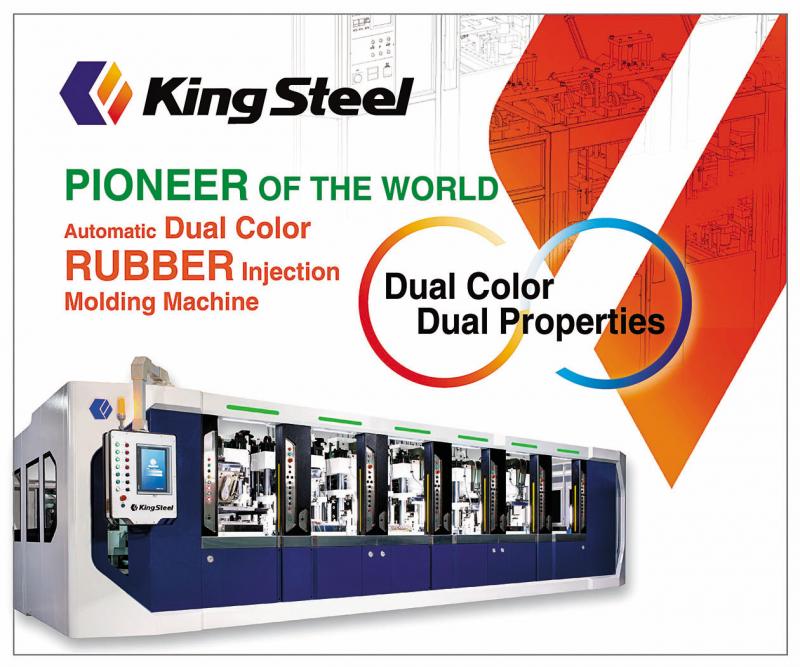The world’s first dual-color rubber injection molding machine, developed by shoe-making machine giant King Steel Machinery Co, has just hit the market. The new machine boasts a number of exclusive advanced functions, including dual shots for both hard and soft materials, multi-injector and multi-mold design and smart manufacturing.
Compared with traditional machines, the new machine reduces manual operation by 60 percent. Because the injection volume for each shot can be controlled with great precision, it is the best solution when manufacturing thinner and lighter sneakers. Since its launch, the hot-selling product has attracted the attention of major international sneaker brands that have introduced the machine into their plants for trial and evaluation for purchase, setting a new trend in the shoe-making industry.
King Steel has specialized for more than 40 years in chemical foaming injection molding equipment, which is used for the injection of ethylene vinyl acetate (EVA) in sneaker insoles and rubber injection for sneaker outsoles.

In order to keep up with ever-changing fashion trends and meet factories’ urgent needs for high functionality equipment, a large part of the company’s annual budget is invested in research and development, product optimization and upgrading. This year, it has taken the lead globally by launching the dual-color rubber injection molding machine, KS9806TL2, which uses fully automated production to replace the traditional manufacturing process, which consists of filling rubber materials and opening/closing molds by hand.
These innovations save customers money, and have been praised as a pioneering industrial invention. With its precise volume control system, the KS9806TL2 is able to precisely control the injection volume for each injection of ultra-thin rubber that is no thicker than 0.7mm. It is the best solution to the industry’s pursuit of light-weighting.
The rubber outsole makes sneakers stronger and more durable. The material is hard-wearing and skid-proof, which are some of the most important characteristics of sneakers. King Steel’s KS9806TL2 can simultaneously combine different materials in dual color, which simplifies the complex process on the outsole production line, as colorful rubber outsoles can be made to perfection through a single injection molding process.
Moreover, rubber outsole production often involves production scheduling difficulties caused by low volume production of multi-color and multi-type products. The KS9806TL2 has multi-injectors that allow flexibility in material use, while at the same time offering a solution for several sole sizes. The multi-station design also ensures multi-mold operations for a mixed production model with high production capacity.
In addition, the efficient operation of the new machine addresses the low efficiency problem of the past single-injector and single-mold design. The machine’s high performance and multi-functional design lowers investment and minimizes the amount of space occupied in the plant, while reducing manpower by up to 60 percent.
(Advertorial)

South Korea’s equity benchmark yesterday crossed a new milestone just a month after surpassing the once-unthinkable 5,000 mark as surging global memory demand powers the country’s biggest chipmakers. The KOSPI advanced as much as 2.6 percent to a record 6,123, with Samsung Electronics Co and SK Hynix Inc each gaining more than 2 percent. With the benchmark now up 45 percent this year, South Korea’s stock market capitalization has also moved past France’s, following last month’s overtaking of Germany’s. Long overlooked by foreign funds, despite being undervalued, South Korean stocks have now emerged as clear winners in the global market. The so-called “artificial intelligence

‘SEISMIC SHIFT’: The researcher forecast there would be about 1.1 billion mobile shipments this year, down from 1.26 billion the prior year and erasing years of gains The global smartphone market is expected to contract 12.9 percent this year due to the unprecedented memorychip shortage, marking “a crisis like no other,” researcher International Data Corp (IDC) said. The new forecast, a dramatic revision down from earlier estimates, gives the latest accounting of the ongoing memory crunch that is affecting every corner of the electronics industry. The demand for advanced memory to power artificial intelligence (AI) tasks has drained global supply until well into next year and jeopardizes the business model of many smartphone makers. IDC forecast about 1.1 billion mobile shipments this year, down from 1.26 billion the prior

People stand in a Pokemon store in Tokyo on Thursday. One of the world highest-grossing franchises is celebrated its 30th anniversary yesterday.

Chinese artificial intelligence (AI) start-up DeepSeek’s (深度求索) latest AI model, set to be released as soon as next week, was trained on Nvidia Corp’s most advanced AI chip, the Blackwell, a senior official of US President Donald Trump’s administration said on Monday, in what could represent a violation of US export controls. The US believes DeepSeek will remove the technical indicators that might reveal its use of American AI chips, the official said, adding that the Blackwells are likely clustered at its data center in Inner Mongolia, an autonomous region of China. The person declined to say how the US government received